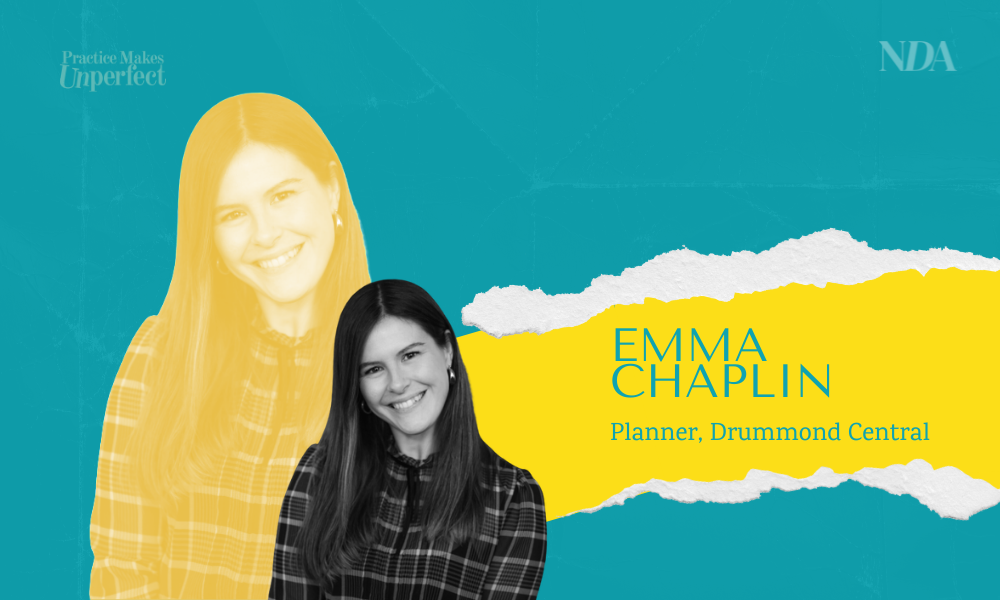By Emma Chaplin, Planner, Drummond Central
These articles have been written by the latest cohort of the Practice Makes UnPerfect programme – a course that helps women find and finesse their public voices
A friend put it to me recently that being in your mid to late twenties can be a bit like navigating the Wild West. Finding something you’re good at – without the benefit of years of experience – that pays your bills, and you enjoy doing it for upwards of seven hours a day can feel like an impossible task.
Growing up with the typically Millennial preoccupation to find not only a job but your Dream Job adds to the pressure. LinkedIn found that 75% of 25-33-year-olds have experienced a quarter-life crisis, with the average age being 27. It can quickly start to sound more Calamity Jane than A Fistful of Dollars.
There’s a typical narrative around climbing the career ladder that feels very linear; it promotes that once you’ve got your foot on the first rung, it’s just upward steps from then on. But to really indulge in the western analogy, it takes more than just True Grit to keep up the momentum.
The struggle to find your place doesn’t happen in a vacuum either. Those of us in our twenties and thirties matured into the workplace against the backdrop of social media and LinkedIn. Whether it’s pictures of mates travelling across different continents or sharing their latest promotion, the compare-and-despair effect is the same.
The default is to share something when it goes right for us – and rightly so. But with such a volume of people only sharing their highlight reels, it can create the cumulative impression that success just happens to other people, without any bumps in the road, tears, late nights, or self-doubts. It can be a breeding ground for feeling inadequate or jealous of people who have seemingly discovered the secret formula.
Another wise friend taught me that jealousy doesn’t need to be an ugly emotion, as long as you use it to figure out precisely what you’re jealous of. Is it their job specifically? Or is it that they’re actually acting on something, whereas you might feel a little static or stuck?
One thing that inspired me to be more proactive and bold in my career choices was to witness my friends and peers take their own leaps first hand. Big or small. Some friends chose to go freelance during the pandemic; others completely winged it and applied for roles they weren’t technically qualified to do. Some people simply continually invest in themselves and their interests. It’s an active choice to feel inspired by these people rather than intimidated or less-than. Especially when they make smaller incremental changes that make the big, inspiring, LinkedIn-worthy ones happen.
See one, do one, teach one
The maxim used by surgeons to teach rookies is a valuable way to think about how we can grow our experience. “See one” reflects the crucial practice of observing those we look up to. “Do one” should be more like “do many” until you eventually shed your junior skin and are trusted to work independently. “Teach one” might be the most important. It doesn’t just benefit whoever you’ve taken under your wing. Teaching is the best way to consolidate and reflect on what you’ve learnt. This has been named The Protégé Effect, which shows how teaching helps you distil important information and reveals crucial gaps in your knowledge and, importantly, holds you accountable.
For people who haven’t yet had the opportunity to line manage, teaching opportunities might not feel as obviously within reach. And consequently, we might think that we don’t have anything worth passing on. Last year, Ipsos found that only 46% of 25-34-year-olds felt they would make a good role model, compared with 61% aged 35-75. Of course, you can only gain expertise with time. But what if we felt that we didn’t have to be experts to have useful insight worth sharing? What if we shared them with peers – or better yet, those more senior and seasoned than us – as we went through them? Even the most accomplished person in the room will have gaps in their experience or would benefit from a new perspective.
Sharing our experiences inevitably butts up against the mistakes we might have made along the way. Speaking as a young(er) female, there is still an implicit pressure to overperform for fear of somehow proving that you don’t deserve to be where you are. So it can be hard to openly admit when you have made a mistake. But sharing these could help to demystify the quarter-life crisis.
I recently heard a more fitting spin on the surgeon’s mantra: ‘See one, fuck one up, teach one’ in Adam Kay’s best-seller-turned-TV-show This is Going to Hurt. If you haven’t already seen it, I will urge you to; it’s a painfully raw and oddly hilarious watch. Although working in advertising is incomparable to the high stakes of your average maternity ward, this mantra gave me pause for thought. Teachable moments don’t have to be perfect.
Suppose you’ve ever queued for the female toilets on a night out (an inevitability). In that case, you may have experienced the conspiratorial glee of admitting some personal misgiving or other to a stranger, only to have them validate and uplift you. We need to channel this energy – and no, I don’t mean trailing all the grisly details of our personal lives into work like a piece of stubborn toilet roll. But let’s be our own imperfect role models who mess up and learn from it, who generously share experiences and lessons and ways to improve. Let’s create opportunities in our workplaces, friendship groups, and online to share what we’ve learned. In real-time.
Let’s recognise that being in the middle of your career is a chance to be an inspiring, educational and ultimately human role model.









